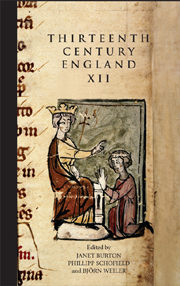Book contents
- Frontmatter
- Contents
- PREFACE
- LIST OF CONTRIBUTORS
- LIST OF ABBREVIATIONS
- The English and the Welsh in Fouke le Fitz Waryn
- Royal Piety in Thirteenth-century Scotland: The Religion and Religiosity of Alexander II (1214–49) and Alexander III (1249–86)
- The 1213 Pipe Roll and Exchequer Authority at the End of John's Reign
- The Public Debate during the Baronial Rebellion
- Richard of Cornwall and the Baronial Opposition in 1263
- Les liens personnels entre les cours de France et d'Angleterre sous le règne de Philippe III, 1270–85
- The Lay Opposition to Edward I in 1297: Its Composition and Character
- Peacekeepers and Lawbreakers in London, 1276–1321
- ‘The peace less kept’? The Origins, Revelations and Impact of Edward I's ‘Trailbaston’ Commissions of 1305–7
- Notes and Documents
Les liens personnels entre les cours de France et d'Angleterre sous le règne de Philippe III, 1270–85
Published online by Cambridge University Press: 12 September 2012
- Frontmatter
- Contents
- PREFACE
- LIST OF CONTRIBUTORS
- LIST OF ABBREVIATIONS
- The English and the Welsh in Fouke le Fitz Waryn
- Royal Piety in Thirteenth-century Scotland: The Religion and Religiosity of Alexander II (1214–49) and Alexander III (1249–86)
- The 1213 Pipe Roll and Exchequer Authority at the End of John's Reign
- The Public Debate during the Baronial Rebellion
- Richard of Cornwall and the Baronial Opposition in 1263
- Les liens personnels entre les cours de France et d'Angleterre sous le règne de Philippe III, 1270–85
- The Lay Opposition to Edward I in 1297: Its Composition and Character
- Peacekeepers and Lawbreakers in London, 1276–1321
- ‘The peace less kept’? The Origins, Revelations and Impact of Edward I's ‘Trailbaston’ Commissions of 1305–7
- Notes and Documents
Summary
Summary
The object of this paper is to study, through the rich material conserved at The National Archives (London) and in a manner that takes us beyond diplomatic negotiation, the personal lines of contact between the French and English royal courts during the reign of Philippe III (1270–85), the contemporary of Edward I (1272–1307). Numerous exchanges and responses between the French and English kings, who were closely related by blood, exist. Letters of recommendation and litterae de statu (concerning the state of health of the correspondents) reveal the existence of a less formal correspondence than that found in the diplomatic documents and elucidate the nature of the relation between the two courts during one of the few periods of peace enjoyed by the two realms. These letters also allow us to understand more fully the nature of political society during the reign of Philippe III as, for instance, certain members of the French king's entourage appear to have enjoyed greater advantages than did others at the English court. This correspondence, as yet little exploited, appears to offer us a range of valuable opportunities.
Le 22 mai 1278, Guillaume de Flavacourt était consacré, à Rome, par le Nicolas III, comme archevêque de Rouen. Dans le courant de l'été, Guillaume regagna son siège. L'archevêque de Rouen avait en Angleterre des droits et des biens pour lesquels il devait prêter hommage au roi Édouard.
- Type
- Chapter
- Information
- Thirteenth Century England XIIProceedings of the Gregynog Conference, 2007, pp. 75 - 90Publisher: Boydell & BrewerPrint publication year: 2009



